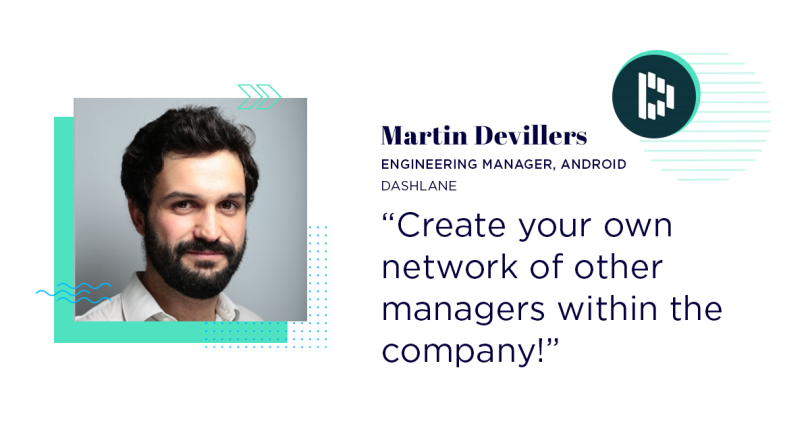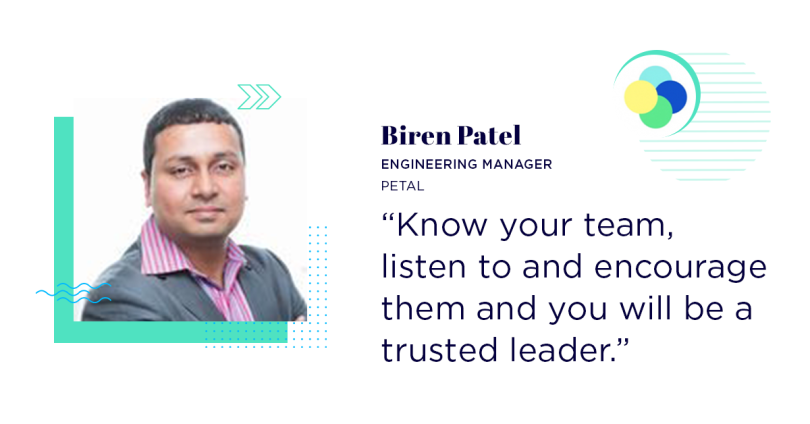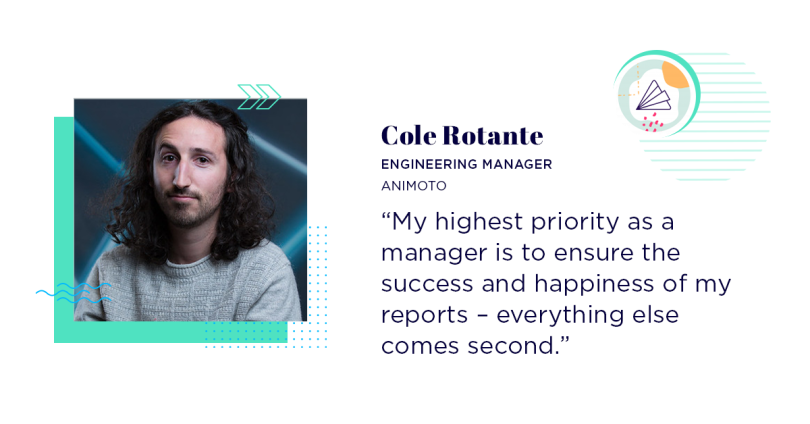Being promoted into a long-anticipated role can sound like a thrill. Stepping into a leadership role as an individual contributor, however, can be a bit more daunting.
After all, it requires an entirely new set of skills, and suddenly you’ve become the keeper of professional wisdom that your employees rely on to accomplish their best work. But having a few foolproof lessons in your back pocket when imposter syndrome strikes can make a big difference in how you lift your teams up to success.
Whether it’s relying on a mentor who has been in your shoes before or asking for feedback as much as you give it, leadership comes in many forms. Each style depends on knowing your team’s unique personalities.
Luckily, everyone in leadership was new once, and that coveted lifelong experience is simply a product of trial and error over time. Built In NYC caught up with eight seasoned engineering professionals to ask about advice they wish they had received when first starting out. Ambitious future leaders out there; consider this your jump start.

Focus on driving outcomes
“For me, there is a big difference between teams that focus on completing work and teams that focus on driving outcomes. When I first went into management, I didn’t realize how important this distinction was. This was many years ago, and although systems like OKRs existed, they were not as popular as they are today.
When managers focus on outcomes, they end up creating an environment where great things can happen. Outcome-driven teams will have more autonomy and feel more ownership when solving problems. This can lead to the team delivering results in ways that one might not have imagined.
At Grailed, we use OKRs to help ensure that we focus on outcomes. We have objectives at all levels of the organization – and we spend a lot of time focusing on alignment around those objectives. By doing so, we ensure that everyone is working toward common goals and creating value.”
Mike Groseclose is the vice president of engineering at Grailed, a fashion commerce company.

Feedback is a two-way street
“Solicit feedback as often as you give it. My team is always more open to hearing my observations after I’ve asked for feedback from them and shown that I appreciate their input. More importantly, as they are the people I work closest with, I really benefit from the feedback they give.
Deliberately asking your team for feedback – and demonstrating that you view an org chart as upside-down (the higher you are, the more people you support) – has helped me better understand what’s important to my team and what they most need me to do to support them.”
Jenny Grange is a UI team lead at Prefect, a dataflow automation platform.

Lead with humility
“Be highly attuned to your insecurities and keep them in check. Some people might argue that this is part of having high EQ but I think a term like ‘emotional quotient’ implies that it’s innate; either you are born with it or not, whereas I believe that being aware of one’s insecurities is a skill that can be developed.
Being attuned to one’s insecurities allows you to nimbly step back when called out instead of taking a defensive stance. For example, let’s say you have a proposal that you weren’t quite prepared for and therefore feel insecure about and your tech lead or product partner points out a couple of flaws. Just acknowledging that you are feeling insecure (to yourself) creates a space for attention for the other and helps direct energy to the right place – you become an investigator instead of a wall. Per one of my favorite and life influencing philosophers, Simone Weil, ‘Attention is the rarest and purest form of generosity.’”
Huiru Jiang is a senior engineering manager at Octane, a fintech lending company.

Remember you can’t do everything yourself
“A huge part of your work as a manager is to help people get to the next steps in their careers, and to do that you are going to use several tools and skills: one-on-ones, defining career development plans and goals, giving and receiving feedback. I’d say the most important and difficult thing I’ve ever had to learn as a manager was how to trust and delegate. As a manager, you can’t do everything yourself. If you do, then you are setting yourself and your reports up for failure.
Learning how to be a manager means learning how to scale, and you can only scale by delegating. It is about finding the right balance – you are going to need to learn what, when and how to delegate. You should be there to unblock and support your team, but without micromanaging. After all, you chose to work with those individuals for a reason: show them that you trust them by delegating accordingly!”
Ingrid Becker is a QA manager at Teachable, an online expertise course platform.

Build a supportive network
“When you transition to a manager role, you suddenly find yourself doing a job that is very different from the rest of your team, so you won't be able to ask them for advice like you could before. They won’t be familiar with the problems you’re facing, and because the power balance has changed, they might also have a harder time being honest with you. Being a manager can feel lonely, especially if you were someone who liked to collaborate a lot with other developers when you were working on features.
At first, it might seem a bit difficult to reach out to other managers, not knowing what to discuss, because you don’t actually need to interact directly. You might not even be involved in the same projects. But in the end, you face the same type of problems, and you can be sure that your reports do as well. It helps to have someone who can empathize and share their experience, and they’ll appreciate being able to share their problems with you as well.
If you’re in a small company where there aren’t many other managers, reach out to communities through meetup groups.”
Martin Devillers is an Android engineering manager at Dashlane, a password management company.

Find a mentor
“Find a mentor who has been through it before and is willing to guide you. There are a ton of articles online telling you how to have better one-on-ones, give feedback and celebrate wins, but nothing beats having someone you can bounce ideas off, talk through issues and come up with ways to continue improving. Find someone at your company who you respect or ask around your network to find a good mentor – you’ll likely be surprised at how many people are willing to spend time to help you out.
When you find someone who is willing to help, make the most of it. Come prepared every time you meet with areas that you are looking for help in and follow up with your mentor after implementing some of their advice. Don’t be afraid to ask for help and you will level up quickly as a new manager.”
Gerrit Yntema is the head of engineering at Alt, an alternative assets platform.

Build a sense of trust
“Knowing your team members means you take the time to learn their unique needs and motivators to keep them excited about their work and also really listen to them, acting on their feedback when possible. Earning the trust of your team is key!
Celebrating wins is an effective strategy to motivate employees and to continue to get to know them better. In the past I’ve organized cake cuttings and lunches together to celebrate birthdays and big moments on the team. In these times together, I invited engineers to share their wins and to also share difficulties they may be facing.
Now in the midst of Covid-19, when we’re all especially vulnerable to burnout, I take any chance to celebrate team successes. At Petal, I can give shoutouts which are shared company-wide during weekly town hall meetings and company update emails so the win gets to be celebrated by everyone, not just our immediate team.”
Biren Patel is an engineering manager at Petal, a credit-building fintech company.

Embrace a people-first mentality
“As I first stepped into a manager position, I didn’t realize how people-focused this role really was. My expectation at the time was more about being able to have all the technical answers. However, when I was given my first direct reports, they were some of the smartest and most senior engineers at the company. I realized my expectations needed to shift.
That’s when I learned: my highest priority as a manager is to ensure the success and happiness of my reports. Everything else comes second. That is to say that the skills needed to be a good manager are largely about people and communication, not code. My focus is on their personality, aspirations, drive, curiosity, ability to communicate, satisfaction and so on.
Most of the skills I implore to guide and drive my reports to success are about listening and communicating back to them. I try to hear them talk about their successes, failures, frustrations, etc. and give them a creative space where they can explore and do their own best problem solving and work.”
Cole Rotante is an engineering manager at Animoto, a video creation platform.





